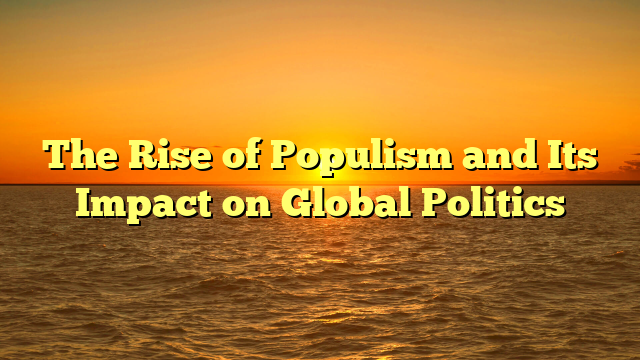
In recent years, the world has witnessed a significant rise in populist movements across both democratic and authoritarian nations. From the United States and Brazil to Hungary and the Philippines, populist leaders have gained traction by promising to represent the “will of the people” while challenging established political elites. While these movements vary in ideology and approach, they share common characteristics: anti-establishment rhetoric, nationalist sentiments, and direct appeals to the public, often through social media. The rise of populism is reshaping global politics, prompting debates about its causes, consequences, and the future of liberal democracy.
One of the primary drivers of populism is widespread dissatisfaction with traditional political systems. In many countries, citizens feel left behind by globalization, technological change, and economic inequality. The 2008 global financial crisis deepened this discontent, exposing vulnerabilities in economic systems and shaking public trust in governments and institutions. Populist leaders have capitalized on this frustration, blaming elites, immigrants, and international organizations for domestic woes and promising radical reforms.
In Western democracies, populism has often taken a right-wing form. Leaders such as Donald Trump in the U.S. and Marine Le Pen in France have emphasized border control, national sovereignty, and protectionist economic policies. They portray themselves as outsiders challenging corrupt establishments, resonating with voters who feel ignored by mainstream parties. In other cases, left-wing populism—such as that seen with leaders like Jeremy Corbyn in the UK or Jean-Luc Mélenchon in France—focuses on economic justice, wealth redistribution, and anti-corporate sentiments.
The impact of populism on governance is complex. On the one hand, populist leaders often energize political participation and bring attention to issues neglected by traditional politicians. They can act as a wake-up call to political systems that have grown complacent or detached from public needs. However, populism can also pose threats to democratic norms. Naga169 have weakened checks and balances, undermined the judiciary, restricted press freedom, and engaged in authoritarian practices under the guise of fulfilling the people’s will.
Internationally, the rise of populism has challenged multilateral cooperation. Populist leaders tend to prioritize national interests over international collaboration, leading to a more fragmented global order. For instance, former President Trump’s “America First” policy resulted in the U.S. withdrawing from several international agreements, including the Paris Climate Accord and the Iran nuclear deal. Similarly, Brexit—driven in part by populist narratives—signaled a move away from supranational governance toward national sovereignty.
Despite these challenges, populism is not inherently negative. It can serve as a necessary corrective force in politics, reminding elites of the importance of public engagement and accountability. However, when taken to extremes, it risks undermining the very democratic structures it claims to protect.
To address the root causes of populism, governments must respond to citizens’ legitimate concerns with empathy and effective policy. This includes addressing economic inequality, ensuring fair access to education and healthcare, and fostering inclusive political dialogue. Media literacy and civic education can also help citizens critically evaluate political messages and resist manipulative rhetoric.
In conclusion, populism is a powerful and evolving force in global politics. While it has the potential to revitalize democratic participation, it also poses significant risks to democratic institutions and international stability. The future will depend on how societies respond—by rejecting simplistic solutions and working collectively to build more responsive and inclusive political systems.





